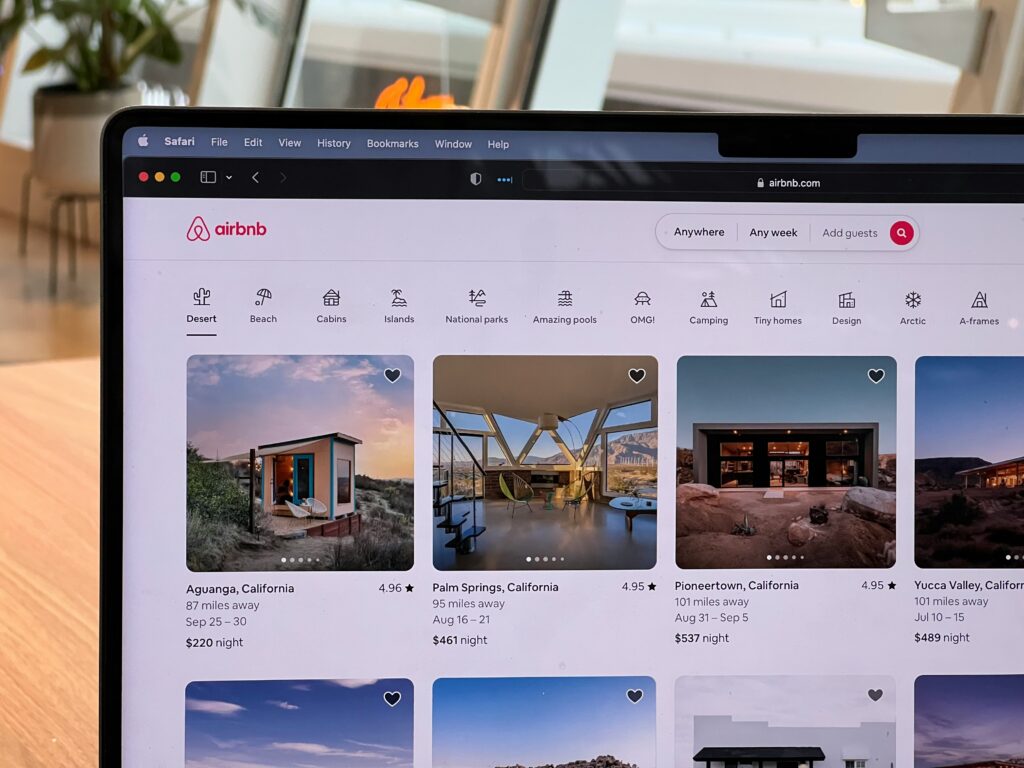Airbnb has opened a unique avenue for homeowners to monetize their properties. A spare room, a vacant condo, or even a whole house can turn into a source of income in the sharing economy. If you’ve been sitting on the fence about renting your spare room on Airbnb, this comprehensive guide will prove to be a valuable resource. It will delve into the dynamics of maximizing earnings and navigating the Airbnb landscape successfully.

The competitive edge in Airbnb hosting lies in understanding the system, attracting the right guests, and providing an experience that keeps them coming back. In this piece, we will unlock the secrets of making a lucrative income through Airbnb, discussing everything from pricing strategies to enhancing guest experiences.
Brace yourself for a journey into the world of hosting, where you’ll discover how to make money from your spare room, effectively handle bookings, manage the expectations of your guests, and much more. The information in this write-up is designed to empower you with the knowledge needed to transform your unused space into a high-earning Airbnb listing. Let’s explore how to make your spare room work for you.
Leveraging Airbnb’s Host Protection Insurance
Airbnb’s Host Protection Insurance, part of the AirCover for Hosts program, provides up to $1 million in liability coverage for hosts. This insurance covers legal liability for bodily injury or property damage claims made by guests or others during a stay at the host’s accommodation. It applies to incidents that occur during an Airbnb stay and are arranged through Airbnb’s platform.
The coverage includes accommodations such as mobile homes, buses, airstreams, watercraft, treehouses, and other unique locations, provided they are parked and used as accommodations. The insurance also covers claim investigation costs and expenses, as well as costs of defending a formal complaint such as a lawsuit.
Hosts should be aware that this insurance is not a substitute for homeowners or renters insurance, which may not cover damages or liabilities arising from short-term rentals. Therefore, hosts are encouraged to review their existing insurance policies and consider obtaining additional coverage if necessary.
In the event of an incident that may be subject to coverage under the Host Protection Insurance, hosts should inform Airbnb immediately by submitting the liability insurance intake form. A third-party claims adjuster appointed by the insurer will then get in touch to discuss the claim and gather information.
Complying with Local Laws and Regulations
Before listing a space on Airbnb, hosts must ensure compliance with local laws and regulations. These may include obtaining permits or licenses, paying occupancy taxes, and adhering to specific safety regulations. Failure to comply can result in fines and penalties, which can impact earnings.
Local laws vary by jurisdiction, and hosts are responsible for understanding and following the rules applicable to their location. This may involve reviewing zoning laws, building codes, and tax regulations. In some areas, Airbnb may assist in collecting and remitting occupancy taxes on behalf of hosts, but this is not universal.
Hosts should also be aware of safety requirements, such as installing smoke and carbon monoxide detectors, providing fire extinguishers, and ensuring clear exit routes. These measures not only comply with regulations but also enhance guest safety and satisfaction.
In addition to local laws, hosts must adhere to Airbnb’s policies, including the Nondiscrimination Policy and Community Standards. Non-compliance with these policies can result in suspension or removal from the platform.
To assist hosts in navigating these requirements, Airbnb provides resources and guidance through its Help Center and Responsible Hosting pages. Hosts are encouraged to utilize these tools to ensure they meet all legal and regulatory obligations.
Staying informed and proactive in understanding and complying with local laws and Airbnb policies is essential for a successful hosting experience. By doing so, hosts can provide a safe and welcoming environment for guests while maximizing their earning potential.
Maintaining High Standards of Hospitality

Your earnings on Airbnb are directly related to your guest’s experience. Therefore, maintaining high standards of hospitality is critical. This includes responding promptly to booking inquiries and questions, providing a clean and comfortable space, and adding personal touches to make your guest feel at home. Remember, a positive guest experience often results in good reviews, which can boost your listing’s visibility and attract more bookings.
Investing in Quality Amenities
Offering quality amenities can significantly enhance your guest’s stay and increase the value of your listing. This includes fast Wi-Fi, a well-equipped kitchen, comfortable bedding, and a clean and functional bathroom. Consider also providing a local guidebook with recommendations for restaurants, attractions, and activities in your area.
Maximizing Your Occupancy Rate
Your occupancy rate, or the percentage of time your space is booked, directly affects your earnings. To maximize your occupancy rate, consider offering discounts for longer stays, which can attract guests seeking longer-term accommodations. Additionally, keep your calendar up-to-date and accept bookings that align with your schedule. Lastly, consider using Airbnb’s Instant Book feature, which allows guests to book your space without prior approval, thus increasing the chance of securing a booking.
Understanding Airbnb’s Fee Structure
Airbnb charges hosts a service fee, which is typically 3% of the booking cost. This fee covers the cost of processing payments. Additionally, Airbnb may charge a host-only fee, which ranges from 14% to 16%, depending on the location of the listing. It’s important to understand this fee structure, as it impacts your earnings.
Understanding Airbnb’s Host Protection Insurance
Airbnb’s Host Protection Insurance, part of the AirCover for Hosts program, provides up to $1 million in liability coverage for hosts. This insurance covers hosts in the rare event they are found legally responsible for a guest’s injury or property damage during a stay. It also extends to individuals assisting with hosting, such as co-hosts and cleaners. The coverage includes incidents like bodily injury to a guest, damage to or theft of a guest’s property, and damage caused by a guest to common areas like building lobbies. However, it does not cover damage to the host’s own property or belongings, which falls under separate Host Damage Protection.
Navigating Local Laws and Regulations
Before listing a property on Airbnb, hosts must ensure compliance with local laws and regulations, which can vary significantly by location. This may involve obtaining permits or licenses, adhering to zoning laws, and paying applicable taxes. For instance, some cities require hosts to register their property, obtain a business license, or comply with specific safety regulations. Failure to comply can result in fines or legal action.
Implementing Best Practices for Hosting
To enhance the hosting experience and ensure compliance, hosts should:
- Research and understand local regulations related to short-term rentals.
- Obtain necessary permits or licenses before listing the property.
- Ensure the property meets safety standards, including functioning smoke detectors and fire extinguishers.
- Clearly communicate house rules and expectations to guests.
- Maintain open and prompt communication with guests to address any issues that arise during their stay.
By taking these steps, hosts can provide a safe and enjoyable experience for guests while protecting themselves legally and financially.
Staying Informed and Proactive
The landscape of short-term rentals is continually evolving, with new regulations and policies emerging regularly. Hosts should stay informed about changes in local laws and Airbnb’s policies to ensure ongoing compliance. Engaging with local host communities and participating in forums can also provide valuable insights and support.
By understanding and utilizing Airbnb’s Host Protection Insurance and adhering to local regulations, hosts can confidently offer their spaces to guests, creating positive experiences while safeguarding their interests.
Conclusion
Renting out your spare room on Airbnb can be a lucrative venture if you approach it strategically. By understanding the basics of Airbnb, maintaining high standards of hospitality, investing in quality amenities, maximizing your occupancy rate, understanding Airbnb’s fee structure, leveraging Airbnb’s Host Protection Insurance, and complying with local laws and regulations, you can maximize your earnings and make the most out of this income-generating opportunity.
Final Thoughts
While Airbnb provides a platform for hosts to earn money, it’s up to you to leverage it effectively. The key to success is to provide value to your guests, create a unique and memorable experience, and manage your listing professionally. With careful planning and execution, you can maximize your earnings and make the most out of Airbnb.
Remember, every successful Airbnb host started as a beginner. Don’t be discouraged by initial challenges. Instead, use them as learning opportunities to improve and grow your hosting business. Good luck!
Conclusion
One of the most crucial aspects of a successful Airbnb listing is the ability to make guests feel at home. The more welcoming and comfortable the environment, the more likely your guests are to leave positive reviews and recommend your space to others. Start with thoughtful touches like fresh linens, basic toiletries, and a clean space. Small details such as a welcome note or a snack basket can go a long way in setting the tone for a positive experience.
Consider incorporating decor that reflects local culture or gives the room a unique personality. Cleanliness should always be your top priority. Many negative reviews stem from dirty or cluttered spaces, which can significantly impact your rating and future bookings.
Using Professional Photography to Enhance Your Listing
Photos are the first thing potential guests see. Investing in professional photography can drastically increase your listing’s appeal. Professional photographers know how to capture light, space, and ambiance, showcasing your room in the best possible way. If hiring a photographer isn’t feasible, use a high-resolution smartphone camera and take photos during the day when natural light is abundant.
Highlight key features like comfortable beds, organized storage spaces, and charming decor. Include photos of any shared areas such as kitchens, patios, or bathrooms, and be honest in your representation. Misleading photography may attract initial bookings, but it will lead to poor reviews and deter future guests.
Writing a Compelling and Honest Listing Description
Beyond photos, your description is the second-most important element of your Airbnb profile. Use clear, concise language to explain what guests can expect. Mention all amenities, including Wi-Fi, heating, air conditioning, and parking options. Explain your house rules and specify any limitations, like quiet hours or pet restrictions.
Use your description to tell a story. Why did you decide to list your space? What do you love about your neighborhood? Personal touches help establish trust and create a more engaging connection with potential guests.
Optimizing Your Airbnb Calendar and Availability
Keeping your calendar updated is essential. Ensure that your availability accurately reflects when your room is ready to host guests. Blocking out dates when the space is unavailable avoids cancellations and negative feedback. Frequent updates to your calendar also improve your visibility in Airbnb’s search algorithm.
Use seasonal strategies to adjust pricing and availability. For instance, if your area experiences a surge in tourism during summer or festival periods, increase your rates slightly and ensure your room is bookable well in advance.
Communication Best Practices for Airbnb Hosts
Excellent communication is the foundation of a great hosting experience. Respond promptly to inquiries and be transparent in your answers. Automate your check-in instructions, house rules, and welcome messages to reduce last-minute confusion and ensure consistency.
Be courteous and available for questions before and during the stay. Many guests value the ability to communicate with their hosts easily. Consider installing a messaging app on your phone for quicker response times.
Ensuring Guest Safety and Comfort
Safety should never be compromised. Equip your space with essentials like a fire extinguisher, smoke detector, and a first aid kit. Clear instructions on emergency exits and contact information for local emergency services should be readily available.
Make sure your guests know how to use appliances, Wi-Fi, door locks, and heating systems. A short manual with instructions placed inside the room can save time and prevent unnecessary calls or confusion.
Managing Cleaning and Turnover Between Guests
Develop a cleaning checklist that you follow after every stay. This includes changing bed linens, cleaning bathrooms, restocking toiletries, and sanitizing high-touch surfaces. Depending on your booking frequency, you may wish to hire a professional cleaner to maintain consistency and quality.
Make sure to inspect your space before each check-in. A last-minute walk-through can help identify issues you might have missed, such as burnt-out lightbulbs or missing towels.
Handling Difficult Guests and Conflict Resolution
Even with the best preparation, not all guests will be ideal. You may encounter guests who break rules, leave the space messy, or make excessive noise. It’s important to approach such situations calmly and professionally.
Start by communicating directly with the guest to resolve any issues. If problems persist, document the behavior and escalate the matter through Airbnb’s support system. Having clear house rules and a strict cancellation or refund policy can protect you in these instances.
Encouraging Positive Reviews and Repeat Guests
After a guest checks out, thank them for staying and politely ask for a review. You can also leave them a review, which increases the likelihood that they’ll do the same for you. Reviews are crucial for building credibility and attracting new bookings.
Consider offering discounts to returning guests or those who book extended stays. Personalized touches and great service often lead to repeat visits and a more stable income stream.
Scaling Up: Expanding Your Airbnb Hosting
If your first listing is successful, you might consider expanding your Airbnb business. This could involve renting out multiple rooms, managing listings for friends or neighbors, or even investing in another property. With each expansion, ensure you can maintain the same level of quality and guest satisfaction.
Before expanding, assess your financial situation, availability, and risk tolerance. Managing multiple properties requires more time and possibly additional staff, but it can also significantly increase your revenue.
Using Guest Feedback to Improve Your Listing
Take guest feedback seriously, especially when it’s constructive. Guests can offer valuable insights into what worked well and what didn’t. Use this information to upgrade your offerings and correct any oversights.
If multiple guests mention a weak Wi-Fi signal or a noisy fan, invest in improvements. This shows that you value guest input and are committed to providing a top-tier experience.
Exploring Additional Income Opportunities Through Airbnb
Besides hosting, Airbnb offers opportunities such as Experiences, where you can guide city tours, teach a craft, or host cooking classes. These options allow you to further monetize your time and skills, especially if you enjoy interacting with people and sharing local culture.
Hosts can also offer add-on services like breakfast, bicycle rentals, or airport pickups. These extras enhance the guest experience while boosting your income per booking.
Creating a Long-Term Strategy for Airbnb Success
Treat your Airbnb listing like a business. Keep track of expenses, revenue, and seasonal trends. Use this data to refine your pricing strategy and improve efficiency. Plan for the long term by upgrading furnishings periodically, staying informed on Airbnb policy changes, and continuously improving your service.
Hosting is not just about making money—it’s about building a reputation. The better your reputation, the more trust you will build with guests and the Airbnb platform itself.



